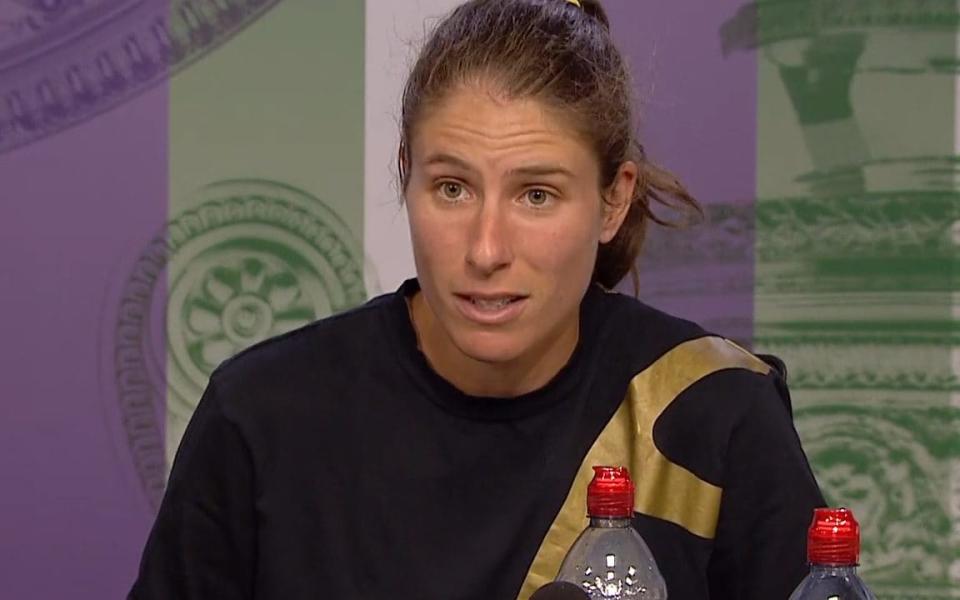Johanna Konta's easily unsettled game might benefit from some of her instinctive press-conference fire

Social media was agog on Tuesday night at the interview-room flare-up between a newspaper reporter and Johanna Konta, who accused him of patronising her with a question about her 33 unforced errors.
It was a rare moment of emotion from Konta in her press conferences, which are normally heavily climate controlled.
Take, for instance, the careful answers she delivered after her world-class win over Petra Kvitova in Monday’s fourth round. After sitting through the interview, New York Times reporter Chris Clarey tweeted “Love listening to Jo Konta news conferences with British media at Wimbledon: The art of dampening expectations and keeping any bold-faced headlines from being written.”
In her post-match comments, Konta tends to stick to two formulas: “I’m happy with the way I dealt with everything today” (win), or “I tried my best and have no regrets” (lose). It’s on those occasional moments when she gets riled that she becomes unexpectedly articulate – and unusually interesting.
It happened last year at the French Open, when she responded to repeated queries about her failure to win a match at Roland Garros with a pointed reply. “If every time you went into work … your colleagues start to say,’ You know, you really suck’,” she asked, in a smart reversal of roles, “would you feel ‘I want to prove these bastards wrong’?”

Such comebacks tend to be highlighted more because Konta is generally so tactful. Yet if she were able to tap into that provocative vein more often – or express some positive passions, for that matter – it would help her connect better with the public. A highly analytical character, she might also find that her tennis benefited from a touch of instinctive fire.
So what went wrong on Centre Court on Tuesday afternoon? For one thing, Barbora Strycova played the match of her life, committing only nine unforced errors and putting 89 per cent of her returns back in court.
But Konta had little to offer, at least after dropping her serve for the first time in the seventh game of the match. We saw the same phenomenon against another Czech, Marketa Vondrousova, in the French Open semi-final a month ago.
Konta doesn’t like going into big matches as the favourite, and she doesn’t like opponents who mess her about with changes of rhythm, pace and spin. When the two arrive together, it’s as if her programming shuts down, and Robo-Jo grinds to an awkward halt, smoke pouring from her central processor.
Strycova’s coach, Lukas Dlouhy, offered a blunt assessment of Konta’s performance yesterday. “She didn’t change anything. That’s why she lost. If you play smart enough and the mistakes are coming [from your opponent] then you have to keep playing the same gameplan.”
For Konta, one ancillary but unintended benefit of her “patronising” riposte was that the post-match debate focused on press-room etiquette instead of her dramatic collapse from 4-1 in the first set: an unexpected decline that saw her win only three of the last 15 games.

The analysis continued yesterday across all the BBC’s news programmes, to the point where it threatened to eclipse the political storm over US ambassador Kim Darroch.
On 5 Live Breakfast, the former British No. 1 Annabel Croft pointed out that “Konta utterly refuses to have anything negative thrown at her and sometimes you do have to take that criticism and be honest.” Later, the supposedly patronising reporter himself – Matt Dunn of The Express – told The World at One that “Her answer was great, it showed some feistiness, it was a valid question and an entirely valid answer.”
Reporters of yesteryear might have found the attention amusing, for interview-room bust-ups were more common in the old days – and sometimes the player had little to do with it.
One day in 1981, the high-falutin’ American correspondents became so indignant at the locals’ preference for asking John McEnroe about his girlfriends rather than his forehands that a fist-fight broke out in the audience. The central combatants were another Express man – Nigel Clarke – and Charlie Steiner of ESPN.
As Clarke has since recalled, “It all ended in a mass scrum, and then the two of us being called into the office of the All England Club chairman ‘Buzz’ Hadingham. He gave us a rollocking, but told me privately that in my shoes he would have done the same thing.”

